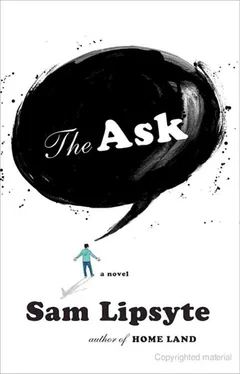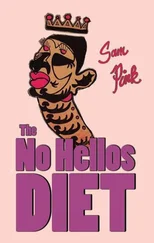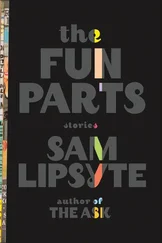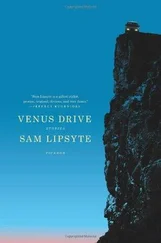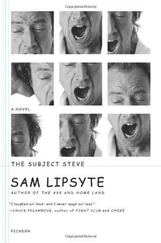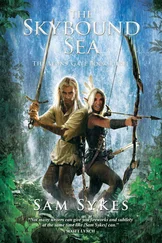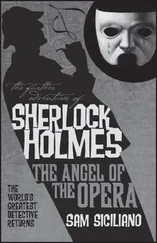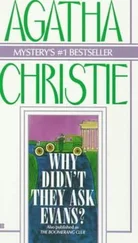"Right," said Predrag.
"I am!" said the kiddie-diddler. "Is there no dignity allowed an old man?"
I threw five dollars on the counter. The kiddie-diddler rose, fixed me with his runny blue eyes.
"Sir, so that I may promptly repay you, with interest, may I enquire as to where you reside?"
"In a fabulous and secret universe of the mind."
The diddler blinked, smiled, patted my arm.
"Lifelong resident myself," he said, walked out.
"Jesus," said Predrag. "Every day with that old homo. I hate him."
"Because of the kids?" I said.
"What kids?"
"I don't know."
"Don't be spreading shit like that," said Predrag. "People get their throats cut, you start talking like that. He never hurt anybody. He's a good man. I just hate him. That's all. He gets in the way of my lie. My lie for myself."
"Your lie?"
"That in America, things can be okay."
"Why do you let him back?" I asked.
"It's his store."
"His store?"
"Well, was. Till he went nuts. Now his brother Tommy runs it. Not a very nice guy, Tommy. Lets his brother roam the streets. That's not America."
"Actually, that is America," I said.
"True," said Predrag, "but I don't want to hear it."
He had his tongs up, somewhat martially.
Out in the night again, below the N tracks, I still didn't want to go home. To slink back into the apartment, yank a blanket around my shoulders on the sofa, it seemed a kind of death.
It was too late for Claudia's house in New Jersey. A hotel in Manhattan would be ruinous. To call Purdy stood for another kind of undoing. It would be a mistake to owe him any more than I did. I still hadn't touched the money in the envelope.
Don Charboneau lived the closest, but he and Sasha just had the one room. I couldn't picture us in a group spoon. Maybe it was time to look into that Cypriot let. Still, I needed a place for tonight. Horace bunked with his mother in Armonk. Or had he not mentioned something about some roommates, a new place in Bushwick?
I called him, was at his door in Brooklyn in an hour.
"Milo," said Horace, shirtless, in dirty corduroys. "Welcome to the coop."
He scratched at his chest, led me into his new home.

Horace lived in a huge room filled with cages. Inside each cage was a young person, a futon or cot, a footlocker, a few milk crates. Bare bulbs on wires hung from fixtures in the high ceiling. I'd read about these places. Kids moved to the city, but there were no apartments left to rent to them, or none they could afford. But on a starting salary, or no salary, you could maybe manage a cage. Several dozen people resided here among the drum kits and guitar amps, the antique film editing deck, a few long tables and spindly chairs, a minifridge. Power cables streaked the floor under mounds of black and silver tape. Laptops glowed from the cages. Voices rose and fell, rippled about the room, a dozen conversations going at once, or maybe one conversation replicated over and over by feral and beautiful children.
The place resembled a new model prison, or one that had achieved a provisional utopia after principled revolt, or maybe a homeless shelter for people with liberal arts degrees. The cages brought to mind those labs with their death-fuming vents near my college studio. These kids were part of some great experiment. It was maybe the same one in which I'd once been a subject. Unlike me, though, or the guinea pigs and hares, they were happy, or seemed happy, or were blogging about how they seemed happy.
Horace had a sleeping bag in his cage, a desktop computer on an upturned box. The floor was cold concrete. A net sack of VHS cassettes dangled from the ceiling, maybe to honor the ancients, their antediluvian delivery systems. Underneath stood a stack of office files, the familiar hunter green tabs. He was taking work home, to his cage. He was a stronger, more adaptable kind of human.
"Miss Armonk?" I said.
"Thanks," said Horace, "but I'm not that pretty."
"No, I mean-"
"I know what you mean. Yeah, sometimes. I mean I miss my mom. The home-nuked meals. We had a lot of laughs. And she has a good hash connection. But my dad thought it was time for me to venture out into the world. Here's the world. You can crash out on the sleeping bag. Not in it. That would be a little gross. Just on it. I've got band practice."
Horace stood, stepped out of the cage. He fastened a padlock to the door.
"Locking me in?" I said.
"Trust me," he said. "It's better this way. They don't do the most rigorous vetting of tenants around here. Most of the kids are cool. But this place can be a creep con, too."
"What if I have to take a leak?"
"There's a jug over there in the corner. Okay?"
"Okay. And thanks."
"Hey, we're on the same team, right?"
"What team is that?"
Horace walked off, joined a few others near the rehearsal platform. He hoisted himself up behind the drums, laid down some lazy paradiddles. A gaunt woman with a constellation of face studs and a coonskin cap fingered a fuzz-toned bass. A bald guy with a microphone duct-taped to his throat dropped for some push-ups. His grunts and a few hard burps roared through the PA. The bass player looked over at the blinking soundboard near the drums.
"Wait!" she called. "We should be recording this!"
They got loud and I got weary. I had worried they would keep me awake but they functioned like the noise machine Maura brought home a few years ago, the one that blasted the crush of waterfalls while we slept, or did until we produced our own noise machine, one with the opposite function, shoved the store-bought model in a closet with our racquetball gear and my home gravlax kit. I fell asleep as the throat-miked youngster gargled schnapps and Horace bashed away on his snare and the girl plucked a two-note bass line much like the two-note bass line I used to pluck back when I also believed it was more authentic if you could not play your instrument whatsoever.
That night I dreamed I was an indentured servant in colonial Philadelphia. Somehow, even in the dream, I sensed that I had once been a development officer in post-colonial New York City, but couldn't be certain. I wore a leather apron with pouches filled with tools, pliers and awls, heavy iron files. My workbench was heaped with broken video games. I had no idea how to fix them, but I knew my master would not let me sleep or eat until I had. Jaw clenched to stanch my sobs, I jabbed a bellows up against the exposed logic board of a console, pumped.
A summer storm whipped the elms outside the workshop window. I heard a knock on the door and a round-shouldered young man with bright gray eyes leaned into the room.
"Ben," I said.
"I came to see if you needed any help, Milo. I know these contraptions tend to bedevil you."
"I'm fine, Ben."
"Truly, Milo, I am here to offer any advice you require. I have been thinking much on the subject of induction. And I feel I owe you after the incident last week in the tavern. I never knew you possessed any Hebraic blood."
"I never knew you were an anti-Semite," I said.
"Well, we do not have that term yet, but I am chancing that you refer to the prophecy I allegedly deliver at the Constitutional Convention sixty years from now? About how the Jews are insidious Asiatics we must protect against? That was a forgery. Everybody knows that."
"But what about the stuff you said at the tavern last week?"
"I just apologized for that."
"Ben," I said, "get the fuck out of here."
"Please, Milo, forgive me. Not for my sake, but for yours. You must relieve yourself of the burdens of resentment. Such an amelioration of the soul will enliven you. I am loath to see you toil with such futility."
Читать дальше
